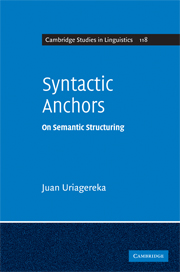Book contents
- Frontmatter
- Contents
- List of tables
- List of figures
- List of acronyms
- Introduction
- Acknowledgements
- 1 In defence of D-structure
- 2 So what's in a word?
- 3 Relational nouns, reference and grammatical relations
- 4 Online conditions and parametric variation
- 5 Prepositional case throughout
- 6 Iteration and related matters
- 7 (Re)Interpreting the Chomsky Hierarchy
- 8 Naturalizing meaning
- Epilogue: Evo-Devo-Perfo
- References
- Index
1 - In defence of D-structure
Published online by Cambridge University Press: 22 September 2009
- Frontmatter
- Contents
- List of tables
- List of figures
- List of acronyms
- Introduction
- Acknowledgements
- 1 In defence of D-structure
- 2 So what's in a word?
- 3 Relational nouns, reference and grammatical relations
- 4 Online conditions and parametric variation
- 5 Prepositional case throughout
- 6 Iteration and related matters
- 7 (Re)Interpreting the Chomsky Hierarchy
- 8 Naturalizing meaning
- Epilogue: Evo-Devo-Perfo
- References
- Index
Summary
Introduction
While the relation between expression and meaning is fixed and arbitrary in words, in sentences it is mediated through syntax, a complex system. This then poses the question of how exactly that mediation takes place, whether it too is arbitrary despite the fact of being unfixed, or it is somehow sensitive to the particular derivational dynamics that result in phonetically expressible semantic concepts. Let's call this the Mapping Problem.
Successive stages of the generative enterprise have addressed the Mapping Problem differently. In the Standard Model, syntactic derivations were thought to start in a semantically articulated logical form, which after various adjustments reaches its phonetic form. In contrast, in the current Minimalist Program (MP), those two ‘levels of representation’ are situated as end-points of a forked derivation, which starts in a purely syntactic object constructed from a list of token words. The latter is the residue of yet a third conception, within the principles & parameters model, for which the starting point of the derivation was a full-fledged level of representation called D(eep)-structure. This level was taken to code lexico-conceptual relations, distinct from the scopal relations achieved through the derivation itself.
A priori, none of these answers to the Mapping Problem seem better or worse: it is an interesting empirical matter to determine which one wins – including possible alternatives.
Information
- Type
- Chapter
- Information
- Syntactic AnchorsOn Semantic Structuring, pp. 1 - 31Publisher: Cambridge University PressPrint publication year: 2008
